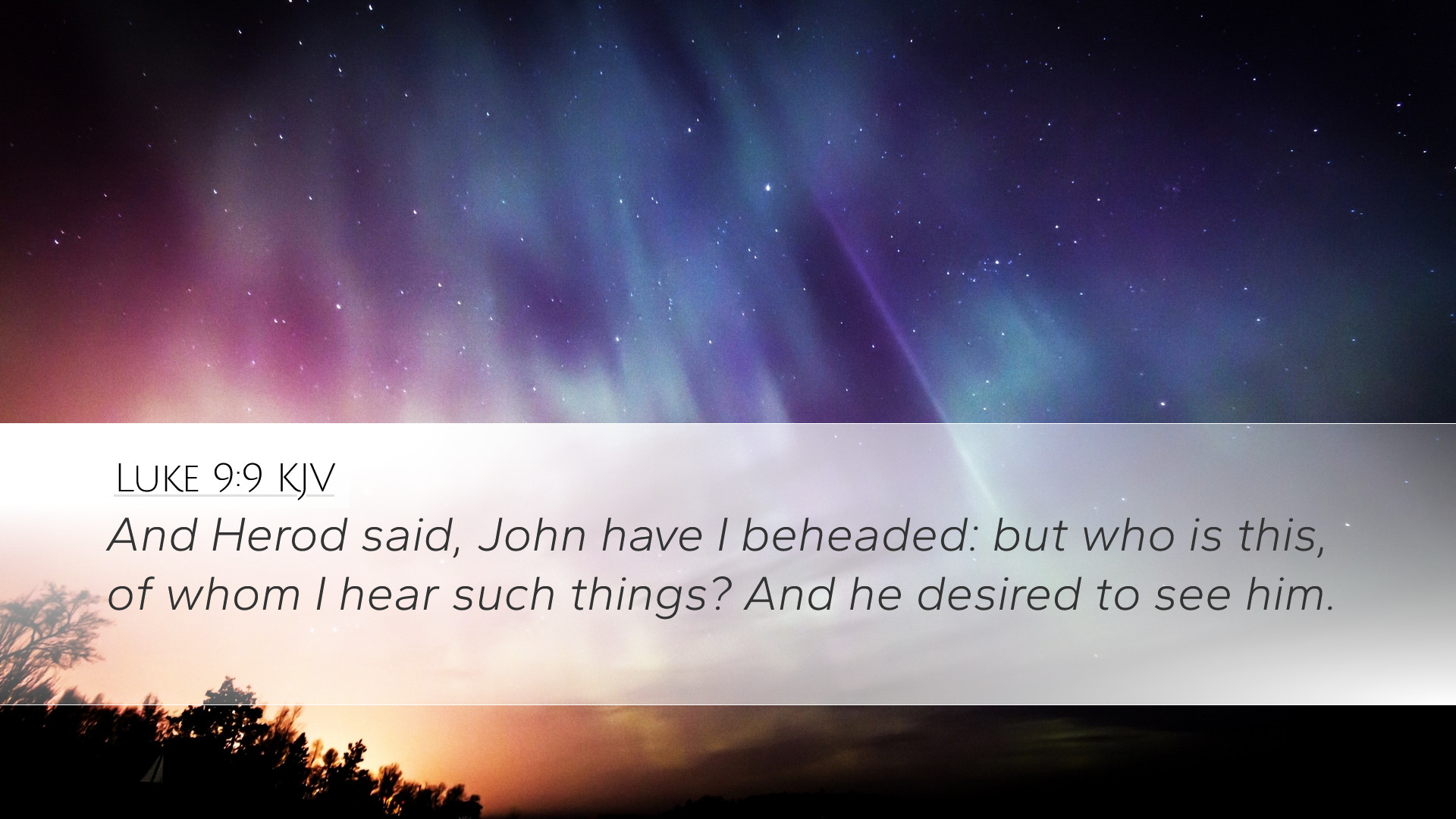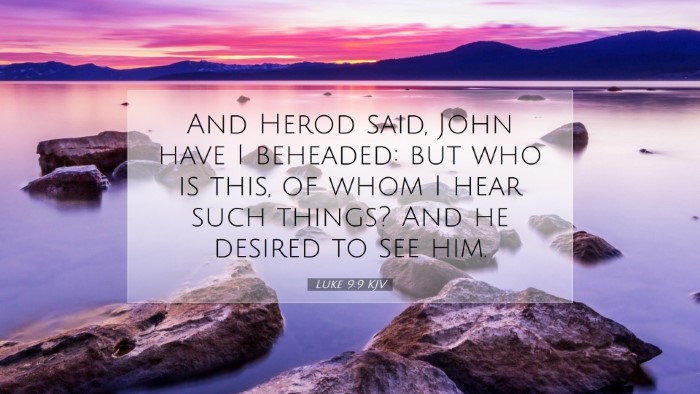Commentary on Luke 9:9
Luke 9:9 (KJV): "And Herod said, 'John have I beheaded: but who is this, of whom I hear such things?' And he desired to see him."
Introduction
Luke 9:9 presents a crucial moment wherein Herod the tetrarch reflects on the rising fame of Jesus, influenced by the echoes of his own past actions, particularly the execution of John the Baptist. This commentary will explore various insights from renowned public domain commentators like Matthew Henry, Albert Barnes, and Adam Clarke, providing a multifaceted perspective suited for pastors, students, theologians, and biblical scholars.
Understanding the Context
To grasp fully the significance of Luke 9:9, one must consider the context within which this verse is situated.
- Historical Background: Herod Antipas, the tetrarch mentioned here, played a vital role in the political and social climate of Judea during the time of Jesus. His actions, particularly against John the Baptist, set a precedent for his later interactions with Jesus.
- Literary Framework: This verse falls within a section of Luke's Gospel that depicts the ministry of Jesus and the reactions it provokes from various societal figures, illustrating the contrast between the Kingdom of God and worldly power.
Exegesis of the Text
Herod's inquiry about Jesus reflects a deep-seated curiosity laced with fear and guilt stemming from his decision to have John beheaded. Below are insights from the mentioned commentators regarding this text:
Matthew Henry's Commentary
Matthew Henry provides an enlightening view of Herod's character and motives:
- Fear and Guilt: Henry emphasizes that Herod, plagued by the memory of his heinous act against John, is now tormented by the suspicion that Jesus might be John risen from the dead. This reveals Herod's troubled conscience, illustrating how evil actions often lead to paranoia and remorse.
- Curiosity about Jesus: According to Henry, Herod expressed not merely casual interest; he desired to see Jesus for himself, which signifies a spiritual yearning possibly buried under layers of sin and guilt.
Albert Barnes' Commentary
Albert Barnes expands on Herod's perspective, noting:
- Political Implications: Barnes argues that Herod’s desire to see Jesus reflects the political ramifications of Jesus' growing influence. It was essential for Herod to understand this new figure attracting the crowds and how this might affect his rule.
- Recognition of Jesus' Authority: Barnes notes that despite Herod’s intrigue, he is also threatened by Jesus' authority and the popularity he gained, posing a challenge to Herod’s control.
Adam Clarke's Commentary
Adam Clarke adds a theological dimension to Herod's inquiry:
- Theological Reflection: Clarke suggests that Herod’s focus on Jesus as “who is this?” can be seen as an unawareness of Jesus' true identity and mission. This ignorance reflects a broader theme of people failing to recognize Jesus as the Messiah.
- Symbol of Rejection: Furthermore, Clarke points out that Herod’s indecisiveness and fear signify the larger Jewish and Gentile rejection of Christ, as they grapple with the implications of Jesus' ministry.
Theological Implications
The passage in Luke 9:9 carries profound theological implications for understanding the nature of authority, guilt, and the identity of Christ. Some key themes to reflect upon include:
- The Nature of Authority: Herod’s inquiry into Jesus' identity highlights the tension between earthly rulers and divine authority. This underpins the struggle for power and the recognition of God’s sovereignty.
- The Weight of Guilt: Herod's actions represent a typical response to sinful actions, wherein guilt manifests as curiosity or a desire to confront the very truth one seeks to evade.
- Identity of Christ: Jesus is often revealed in the Gospels not merely through direct identification, but through the echoes of others' conclusions and assumptions about Him. This reflects the need for personal revelation regarding Christ's true identity.
Practical Application
In drawing insights from Luke 9:9, there are practical applications for today's believers:
- Self-Examination: Like Herod, one must ask personal questions about Jesus' identity and influence. What is one's perception of Christ, and how does it affect personal faith?
- Addressing Guilt: Believers are called to confront their sins. Guilt may often push one toward a search for truth—an opportunity to encounter Christ and seek forgiveness.
- Courage in Witnessing: Just as Herod sought to see Jesus, Christians today are encouraged to share their faith actively. The desire to know Christ deeply should propel the believer into action.
Conclusion
Luke 9:9 serves as a poignant reminder of the human condition: curiosity amid guilt, the struggle with authority, and the ongoing quest to understand Jesus' identity. Through the insights of Matthew Henry, Albert Barnes, and Adam Clarke, the complexity of this verse unfolds, revealing the layers within the encounter of Herod with Jesus. As scholars, pastors, and students engage with this text, may it motivate deeper reflection and a more profound relationship with Christ.


